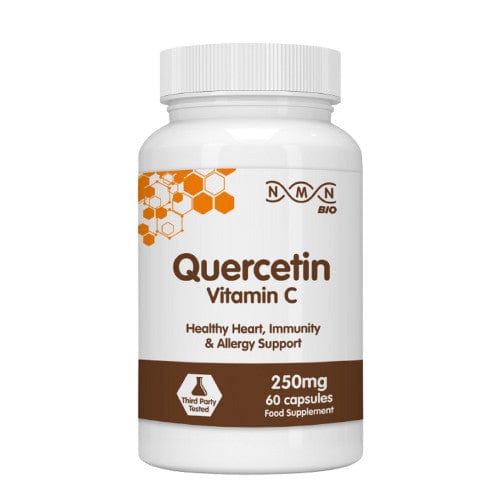NM Bio Quercetin with Vitamin C | 60 capsules
NM Bio Quercetin with Vitamin C | 60 capsules
Couldn't load pickup availability
What Is It?
What Is It?
Support healthy ageing by supplementing with quercetin.
The high purity of NMN Bio Ltd’s Quercetin enables you to efficiently decrease senescence, fight inflammation and support a healthy cardiovascular system, all paramount in fighting the signs of ageing.
NMN Bio extensively 3rd party test their products at each batch, guaranteeing your quercetin is of a pharmaceutical grade, with a purity of more than 98%, that is an allergen-free and vegan product. Providing this premium quality quercetin ensures the highest bioavailability possible.
Product Benefits
Product Benefits
<p><strong>SENESCENT CELLS CLEARANCE</strong> – Quercetin can clear dead cells, improving the overall function of the body and acting as a detoxifying agent. Quercetin has shown potent senolytic effects in multiple studies.</p><p><strong>ANTI-INFLAMMATORY</strong> – Research shows Quercetin helps with inflammation. The presence of senescent cells is linked to inflammaging, the process of increased inflammation that correlates with old age. By clearing out senescent cells Quercetin helps fight inflammation and ageing and is understood to help preserve NAD+ levels.</p><p><strong>SUPPORTS CARDIO HEALTH</strong> - Quercetin is a natural compound that supports a healthy cardiovascular system.</p><p><strong>PACKAGED AND TESTED IN THE UK</strong> - All of our products are third party tested by CAMPDEN BRI before encapsulation and packaging in a class 7 pharmaceutical grade, ISO9001 certified facility in the UK.</p>
Nutritional Information
Nutritional Information
<p>Quercetin, Vitamin C (as ascorbic acid), Citrus Bioflavonoids, Microcrystalline Cellulose, Magnesium Stearate, Vegetable Cellulose Capsule.
Suggested Use
Suggested Use
<p>Take around 500mg of Quercetin per day, with your first or second meal of the day. This dosage has been shown to be safe and effective in humans.</p>

Free Next Day Delivery
On orders over £50
Easy Returns
30-day return policy
Secure Payment
100% secure checkout
Trusted Brands
Dedicated customer service

